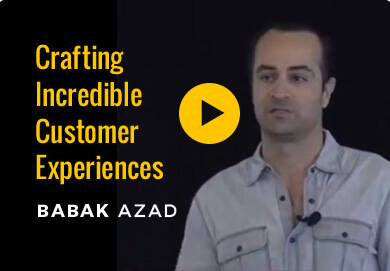
I was on vacation for the past week. And while I do a good job of unplugging and unwinding, there are certain parts of my brain that just don’t turn off – since I’m very big on service in almost any context, I am always paying particular attention to where I get great service and where I get lousy service.
After taking a red-eye to JFK with my wife and 2 young boys, we took the AirTrain to the Budget rental car location, arriving there around 8am on Thursday morning. I realized very quickly that the line was going to take a while to get through. After 15 minutes, and with some time to kill, I sent the following tweet:
To which I got the following reply
To their credit, they responded within 45 minutes – not amazing, but certainly not 24 hours later.
Below is the full back-and-forth I had with them.
My biggest problem is this: they didn’t do anything for me that an agent couldn’t (or actually didn’t really) do in person. I just got a status check-in and an apology.
But that’s not what I was looking for.
Where was the “Wow” service that Tony Hsieh refers to? Rather than viewing a frustrated customer interaction as simply a way to let me vent, why not recognize this as an opportunity, in plain view of anyone who might’ve come across this interaction, to deliver a great experience.
Here’s a sampling of what I think they could’ve done:
- Offer 10% off
- Offer a $50 coupon for a future rental.
- Ask me how long my trip is (it was 7 days), and give me a day or two free.
- Upgrade my car – especially since at the beginning of the interaction I clearly hadn’t gotten my car.
- Take the conversation offline to help me out.
- While I didn’t say I was with my family, my language of “other family” seemed to imply I was with mine – ask about that and see if there’s something they could do given the stresses of travelling with family rather than on my own.
- 50 other things that could’ve shown a sense of the value of a customer (to be noted, this is the first time I’ve rented from Budget in years. And likely will be another few years until they get my business given how many options there are.)
The point is, they did none of those things.
It’s great to get a response. Thanks for the apology. But I got no sense of personal service, or that my comment re: scheduling staff would be passed along.
And the reality is that I have no clue why that was the case. Maybe agents are told to do what they did. Maybe they genuinely don’t know better. Maybe they are new to the job. Maybe they don’t have much authority. Maybe they are on their way out. Maybe, maybe, maybe.
But customers don’t consider the “why” – they just have their experience. So it doesn’t matter what the “maybe” is. Just what the outcome is.
I reward Budget for being on Twitter and responding. But at the end of the day, having a presence is moot if the person handling the interaction doesn’t do anything meaningful.
Negative feedback is never a great thing to get, but if viewed as an opportunity rather than a “bummer” or annoyance, it can be an opportunity to fix a less-than-ideal situation and to show it off to the public.
As a friend told me years ago, none of us is perfect. And we won’t keep 100% of our commitments, but it’s how we manage those broken commitments that makes the difference.
How do you and your brand manage broken commitments – and are you able to turn unhappy customers with a bad experience into brand evangelists by showing them just how much you value them?
Please leave a comment below because I’d like to hear what you think.






Leave a Reply
You must be logged in to post a comment.